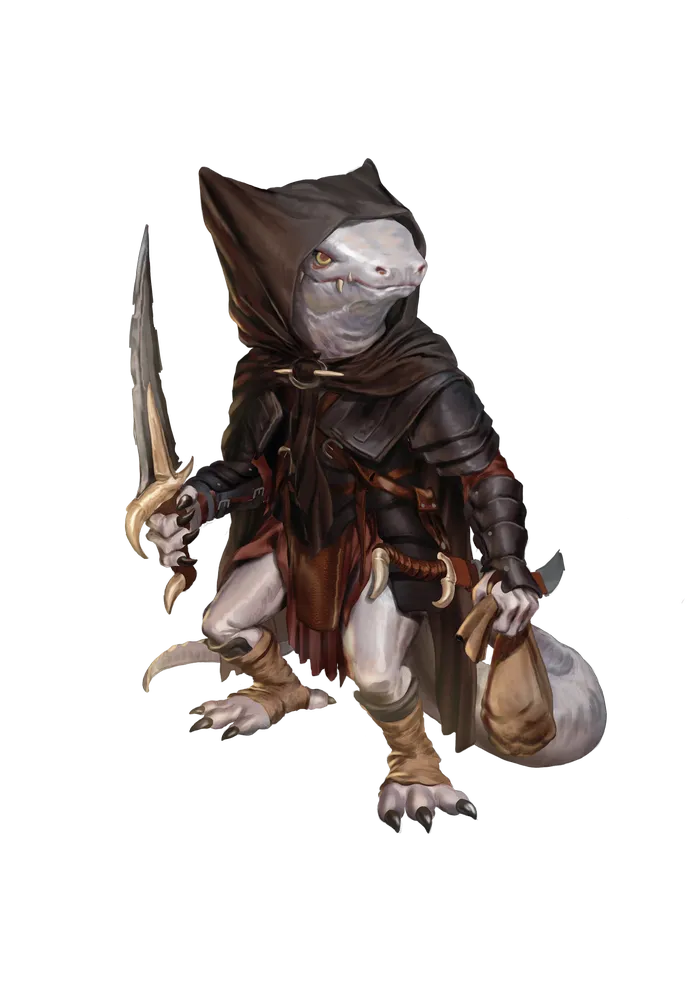There is a Legacy version
here.

Kobold
 Uncommon Humanoid Kobold Source Player Core 2 pg. 21PFS Note
Uncommon Humanoid Kobold Source Player Core 2 pg. 21PFS Note All Pathfinder agents have access to the kobold ancestry
Kobolds are small and reptilian, with features marked by the power they choose to follow.Every kobold instinctively understands the importance of power, and many are inclined to venerate those who have it, whether they be mighty dragons, cruel fiends, imperious fey, or even ancient artifacts. Kobolds seek out these alliances out of a sense of pragmatism— after all, who would dare bully a kobold who serves an ancient dragon?—but also because kobold eggs incubated near such loci of power take on physical traits (and sometimes abilities) similar to those of the warren's benefactor. On their own, kobolds are ingenious crafters and devoted allies, but outsiders who trespass into their territory find them to be inspired skirmishers and clever ambushers. However, these reptilian opportunists prove happy to cooperate with other humanoids when it's to their benefit, combining caution and cunning to make their fortunes in the wider world.
If you want a character with deadly cunning and who bears the mark of a powerful benefactor, you should play a kobold.
You Might...
- Analyze your surroundings, always looking for ambushes, advantageous terrain, and escape routes.
- Naturally observe, adopt, and respect group dynamics, whether as leader, subordinate, or equal.
Others Probably...
- Assume that you are cowardly and won't stick around in the face of danger.
- Appreciate your ingenuity and resourcefulness, especially when it comes to building defenses.
Physical Description
Kobolds are short (about 3 feet tall), reptilian humanoids with slender bodies, long tails, and stout horns. Their features often reflect the nature of their warren's benefactor, such as vestigial draconic wings or glowing crystalline growths. These differences set warrens apart, though all kobolds are generally easily recognizable as such.
Kobolds mature quickly, reaching adulthood by about 12 years and living to about 60. Some rare kobolds live even longer after harnessing the power of a magical benefactor.
Society
Kobolds have an ingrained cautiousness that keeps them alive. They're secretive or subservient around powerful creatures to avoid becoming victims. This meekness fades once kobolds secure either a formidable benefactor (like a dragon) or a potent source of supernatural power (like an artifact or sorcerous leader). Kobold societies regularly adopt laws and cultural norms inspired by their benefactor's personality. However, kobolds are infamous for sensing a proverbial sinking ship, and once their source of power fails or seems doomed, their morale breaks swiftly.
Beliefs
All but the most iconoclastic kobolds have a natural respect for hierarchies and rules, relying on their ancestral social strategies for survival.
Organized religion feels natural for most kobolds. They're often drawn to deities related to their benefactors, such as
Asmodeus if the benefactor is a devil, or dragon deities like
Apsu and
Dahak if the benefactor is a dragon. Kobolds also often find themselves drawn to cults, particularly those with powerful magical creatures as figureheads.
Popular Edicts find your place in any power structure, take pride in your allies' strength, win with your wits
Popular Anathema face a threat alone, throw caution to the wind
Names
A young kobold's given name is rarely more than a syllable or two. However, as they age, achieve status, and accomplish great deeds, they might add more syllables to their names. Kobolds rarely have surnames except in an effort to better fit into a community, in which case they typically adopt the surname of an inspiring figure in that group.
Sample Names
Azrnak, Draahzin, Enga, Fazgyn, Fazij, Jekkajak, Kib, Kirrok, Mirkol, Tarka, Urkak, Varshez, Vroklan, Zekstikah, Zgaz
Kobold Mechanics
Hit Points
6
Size
Small
Speed
25 feet
Attribute Boosts
Dexterity
Charisma
Free
Attribute Flaw
Constitution
Languages
CommonSakvrothAdditional languages equal to your Intelligence modifier (if it's positive). Choose from
Aklo,
Diabolic,
Draconic,
Dwarven,
Empyrean,
Fey,
Gnomish, and
Petran, and any other languages to which you have access (such as the languages prevalent in your region).
You can see in
darkness and
dim light just as well as you can see in
bright light, though your vision in darkness is in black and white.